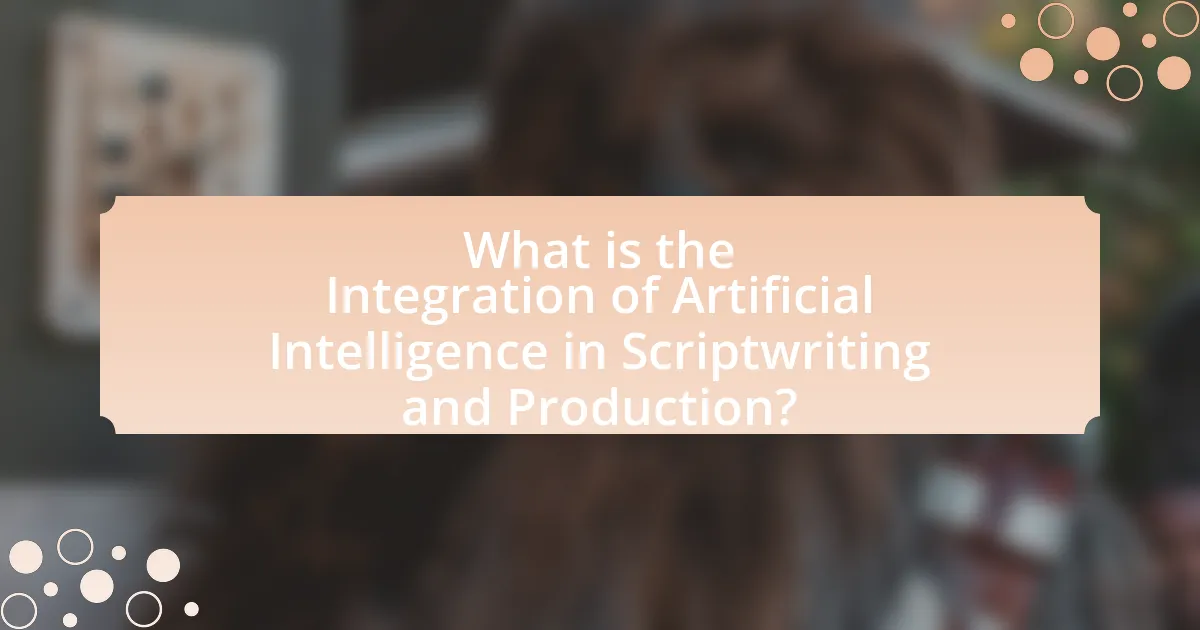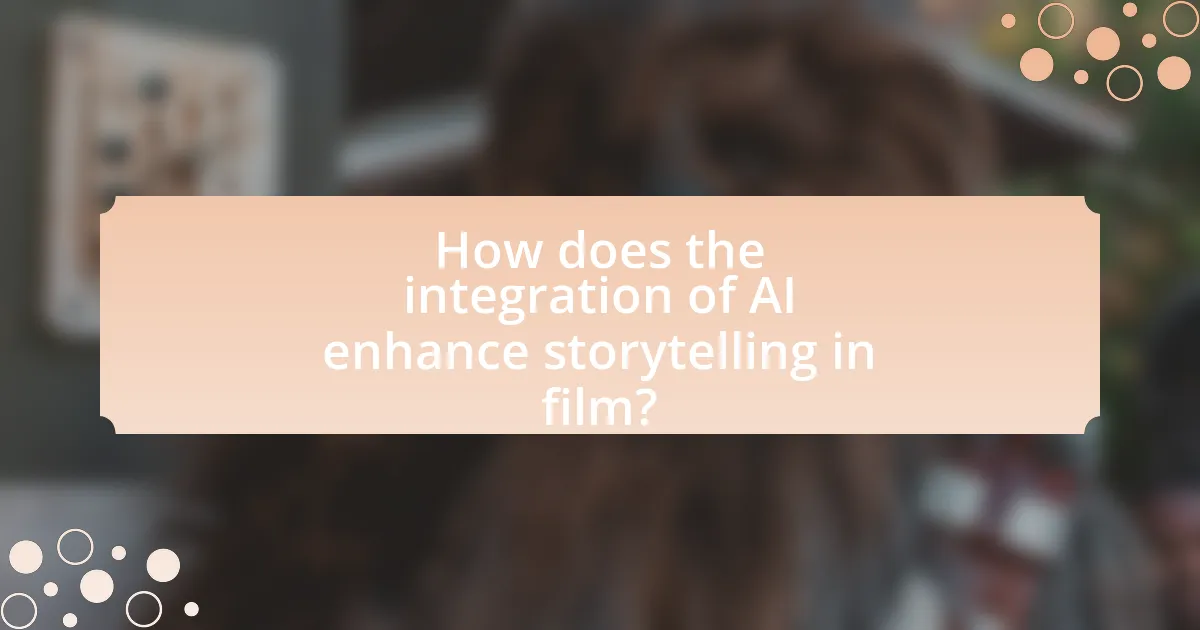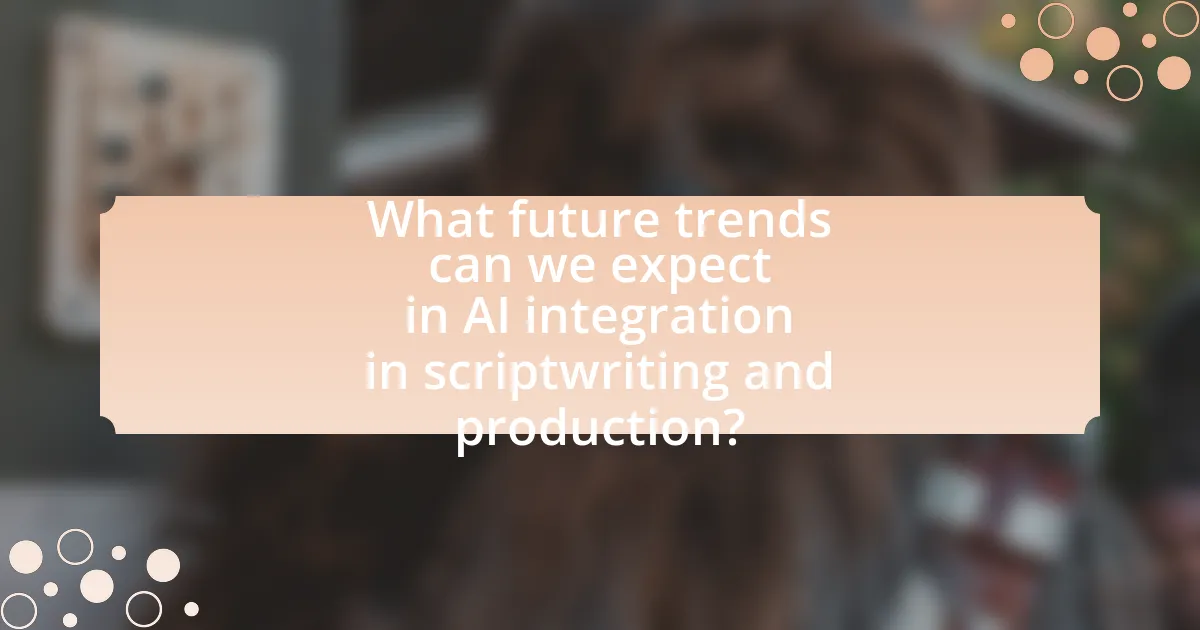The integration of artificial intelligence (AI) in scriptwriting and production is revolutionizing the filmmaking industry by enhancing creativity, streamlining processes, and improving decision-making. AI tools analyze data on audience preferences and script trends, assisting writers in developing engaging narratives while automating tasks such as scheduling and budgeting in production. This article explores how AI transforms scriptwriting through content generation and character development, its role in production efficiency, and the implications for post-production processes. Additionally, it addresses the challenges and ethical considerations of AI integration, highlighting future trends and best practices for filmmakers to balance AI assistance with human creativity.

What is the Integration of Artificial Intelligence in Scriptwriting and Production?
The integration of artificial intelligence in scriptwriting and production involves utilizing AI technologies to enhance creativity, streamline processes, and improve decision-making in the filmmaking industry. AI tools can analyze vast amounts of data, such as audience preferences and script trends, to assist writers in developing compelling narratives. For instance, platforms like ScriptBook use machine learning algorithms to predict a script’s success based on historical data, providing insights that can guide revisions. Additionally, AI-driven software can automate tasks such as scheduling, budgeting, and even casting, thereby increasing efficiency in production workflows. This integration not only optimizes the creative process but also allows for more data-informed decisions, ultimately shaping the future of storytelling in film and television.
How is Artificial Intelligence transforming the scriptwriting process?
Artificial Intelligence is transforming the scriptwriting process by automating content generation and enhancing creativity through data analysis. AI tools can analyze vast amounts of existing scripts and audience preferences, enabling writers to create more engaging narratives tailored to specific demographics. For instance, platforms like ScriptBook utilize machine learning algorithms to predict a script’s success based on historical data, providing writers with actionable insights. This integration not only streamlines the writing process but also allows for more innovative storytelling by suggesting plot developments and character arcs based on trends and audience feedback.
What specific AI tools are used in scriptwriting?
Specific AI tools used in scriptwriting include Final Draft, Celtx, and ScriptAI. Final Draft is a widely recognized software that incorporates AI features for formatting and story structure analysis. Celtx offers collaborative tools and AI-driven suggestions for character development and plot progression. ScriptAI utilizes natural language processing to generate dialogue and plot ideas based on user prompts. These tools enhance the scriptwriting process by providing writers with intelligent suggestions and structural guidance, thereby improving efficiency and creativity in script development.
How do AI algorithms analyze and generate scripts?
AI algorithms analyze and generate scripts by utilizing natural language processing (NLP) techniques to understand context, structure, and themes within existing scripts. These algorithms are trained on vast datasets of scripts, allowing them to identify patterns in dialogue, character development, and plot progression. For instance, models like OpenAI’s GPT-3 leverage deep learning architectures to predict the next word in a sequence based on the preceding text, enabling them to create coherent and contextually relevant script content. This process is validated by the success of AI-generated scripts that have been recognized in various competitions and industry applications, demonstrating the effectiveness of AI in scriptwriting.
What role does AI play in the production phase of filmmaking?
AI plays a significant role in the production phase of filmmaking by optimizing various processes such as scheduling, budgeting, and resource allocation. For instance, AI algorithms analyze historical data to predict potential delays and budget overruns, allowing production teams to make informed decisions. Additionally, AI-driven tools can assist in casting by analyzing actor performances and audience preferences, enhancing the selection process. A study by the University of Southern California found that AI can reduce production time by up to 30% through efficient project management and automation of repetitive tasks. This integration of AI not only streamlines operations but also enhances creative decision-making in filmmaking.
How does AI assist in casting and crew selection?
AI assists in casting and crew selection by analyzing vast amounts of data to identify the most suitable candidates for roles and positions. This technology evaluates actors’ past performances, audience reception, and social media presence to predict their potential success in specific roles. Additionally, AI algorithms can assess crew members’ skills, experience, and past collaborations to optimize team dynamics and project outcomes. For instance, a study by the University of Southern California found that AI-driven casting tools can increase the accuracy of match predictions by up to 30%, demonstrating the effectiveness of AI in enhancing decision-making processes in the film industry.
What are the implications of AI in post-production processes?
AI significantly enhances post-production processes by automating tasks such as video editing, color correction, and sound design. For instance, AI algorithms can analyze footage and identify the best takes, reducing the time editors spend sifting through hours of material. Additionally, AI-driven tools like Adobe Premiere Pro’s Sensei can automatically adjust color grading based on scene context, improving visual consistency. A study by the University of Southern California found that AI can reduce post-production time by up to 30%, demonstrating its efficiency and effectiveness in streamlining workflows.
What challenges arise from integrating AI in scriptwriting and production?
Integrating AI in scriptwriting and production presents several challenges, including the potential for reduced creativity, ethical concerns, and technical limitations. The reliance on AI-generated content may lead to formulaic storytelling, as algorithms often analyze existing scripts and trends rather than fostering original ideas. Ethical concerns arise regarding authorship and intellectual property, as the use of AI can blur the lines between human creativity and machine-generated work. Additionally, technical limitations, such as the inability of AI to fully understand nuanced human emotions and cultural contexts, can hinder the quality of scripts produced. These challenges highlight the complexities of incorporating AI into creative processes, necessitating careful consideration and balance between technology and human input.
How does AI impact the creative process of human writers?
AI significantly enhances the creative process of human writers by providing tools that streamline brainstorming, editing, and content generation. For instance, AI-driven platforms can analyze vast amounts of data to suggest plot ideas, character development, and dialogue options, which can inspire writers and expand their creative horizons. Research by the Stanford University Human-Centered AI Institute indicates that writers using AI tools report increased productivity and a broader range of creative possibilities, as these tools can generate multiple variations of a narrative or suggest alternative endings. This integration allows writers to focus more on the artistic aspects of storytelling while leveraging AI for efficiency and inspiration.
What ethical considerations must be addressed with AI in filmmaking?
Ethical considerations that must be addressed with AI in filmmaking include issues of authorship, bias, and the potential for job displacement. Authorship concerns arise when AI-generated content challenges traditional notions of creativity and ownership, as seen in debates over copyright for AI-created scripts. Bias is a significant issue, as AI systems can perpetuate existing stereotypes and inequalities if trained on biased datasets, impacting representation in films. Job displacement is another critical concern, as the automation of certain roles in filmmaking could lead to reduced employment opportunities for human creatives, as evidenced by industry reports indicating a shift in job dynamics due to AI technologies.

How does the integration of AI enhance storytelling in film?
The integration of AI enhances storytelling in film by enabling data-driven insights that inform narrative development and character arcs. AI algorithms analyze vast amounts of existing scripts, audience preferences, and box office trends, allowing filmmakers to craft stories that resonate more effectively with viewers. For instance, AI tools like ScriptBook can predict a script’s success by evaluating its structure and themes against successful films, providing filmmakers with actionable feedback. This data-centric approach not only streamlines the writing process but also increases the likelihood of audience engagement, as evidenced by films that have utilized AI analytics to refine their narratives and achieve higher box office performance.
What are the benefits of using AI for narrative development?
The benefits of using AI for narrative development include enhanced creativity, efficiency in content generation, and data-driven insights. AI tools can analyze vast amounts of data to identify trends and audience preferences, allowing writers to craft narratives that resonate more effectively with viewers. For instance, AI can generate plot ideas or character arcs based on successful storytelling patterns observed in existing media, thereby streamlining the brainstorming process. Additionally, AI can assist in editing and refining scripts, reducing the time spent on revisions. Studies have shown that AI-generated content can lead to higher engagement rates, as it is tailored to meet audience expectations.
How can AI analyze audience preferences to shape stories?
AI can analyze audience preferences by utilizing data mining techniques and machine learning algorithms to identify trends and patterns in viewer behavior. By examining social media interactions, viewing histories, and demographic information, AI can determine what themes, genres, and character types resonate most with specific audiences. For instance, a study by the University of Southern California found that AI tools could predict audience engagement levels based on script elements, leading to more tailored storytelling. This data-driven approach enables creators to craft narratives that align closely with audience interests, ultimately enhancing viewer satisfaction and engagement.
What examples exist of successful AI-generated narratives?
Successful AI-generated narratives include the short film “Sunspring,” which was entirely scripted by an AI named Benjamin, showcasing its ability to create coherent dialogue and plot structure. Another example is “The Last Job on Earth,” a narrative generated by OpenAI’s GPT-3, which was used to create a compelling story that engaged audiences. Additionally, the interactive storytelling experience “AI Dungeon” utilizes AI to generate endless narratives based on user input, demonstrating the versatility and creativity of AI in narrative generation. These examples illustrate the potential of AI in scriptwriting and production, as they have garnered attention for their innovative approaches to storytelling.
How does AI influence character development and dialogue?
AI significantly influences character development and dialogue by enabling more nuanced and dynamic interactions through data-driven insights. By analyzing vast amounts of text, AI can identify patterns in character behavior and dialogue styles, allowing writers to create more authentic and relatable characters. For instance, AI tools like OpenAI’s GPT-3 can generate dialogue that reflects specific character traits, enhancing consistency and depth in storytelling. Additionally, AI can simulate audience reactions, helping writers refine character arcs and dialogue to better resonate with viewers, as evidenced by projects that utilize AI for script analysis and optimization, leading to improved narrative engagement.
What techniques does AI use to create realistic dialogue?
AI employs techniques such as natural language processing (NLP), machine learning, and neural networks to create realistic dialogue. NLP enables AI to understand and generate human-like text by analyzing language patterns, semantics, and context. Machine learning algorithms are trained on vast datasets of conversations, allowing AI to learn the nuances of dialogue, including tone, style, and emotional cues. Neural networks, particularly recurrent neural networks (RNNs) and transformers, enhance the generation of coherent and contextually relevant responses by maintaining context over longer exchanges. These techniques collectively contribute to the authenticity and fluidity of AI-generated dialogue, making it more relatable and engaging for users.
How can AI help in developing multi-dimensional characters?
AI can help in developing multi-dimensional characters by analyzing vast amounts of narrative data to identify complex character traits and arcs. Through natural language processing and machine learning algorithms, AI can evaluate existing literature and scripts to discern patterns in character development, emotional depth, and relational dynamics. For instance, AI tools can assess character interactions and motivations, providing insights that enhance authenticity and relatability. Research has shown that AI-driven character analysis can lead to richer storytelling, as seen in projects like “Sunspring,” a short film entirely scripted by AI, which demonstrated the potential for nuanced character creation.

What future trends can we expect in AI integration in scriptwriting and production?
Future trends in AI integration in scriptwriting and production include enhanced collaboration between human writers and AI tools, increased use of data analytics for audience targeting, and the development of AI-generated content that aligns with viewer preferences. AI tools are expected to assist writers by providing real-time feedback and suggestions, thereby streamlining the creative process. Additionally, data analytics will enable producers to tailor scripts based on audience insights, improving engagement and success rates. A report by PwC indicates that AI could contribute up to $15.7 trillion to the global economy by 2030, highlighting its potential impact across various industries, including entertainment.
How might AI evolve in its role within the film industry?
AI is likely to evolve in the film industry by enhancing scriptwriting, production efficiency, and audience engagement. As AI algorithms become more sophisticated, they will analyze vast amounts of data to identify successful storytelling patterns, enabling writers to create compelling narratives. For instance, AI tools like ScriptBook can predict a script’s success based on historical data, which can guide writers in their creative process. Additionally, AI will streamline production workflows through automation of tasks such as scheduling, budgeting, and even visual effects, as seen with tools like Runway ML. This evolution will not only improve the quality of films but also reduce costs and time in the filmmaking process, ultimately transforming how films are made and consumed.
What advancements in AI technology could impact scriptwriting?
Advancements in AI technology that could impact scriptwriting include natural language processing, machine learning algorithms, and automated content generation tools. Natural language processing enables AI to understand and generate human-like dialogue, allowing for more realistic character interactions. Machine learning algorithms can analyze successful scripts and identify patterns, helping writers create compelling narratives. Automated content generation tools can assist in brainstorming ideas or drafting scripts, streamlining the writing process. These technologies have been shown to enhance creativity and efficiency in scriptwriting, as evidenced by projects like OpenAI’s GPT-3, which has been utilized to generate coherent and contextually relevant text across various genres.
How will AI shape the future of film production workflows?
AI will significantly enhance film production workflows by automating repetitive tasks, improving decision-making, and optimizing resource allocation. For instance, AI algorithms can analyze scripts for pacing and character development, providing insights that help writers refine their narratives. Additionally, AI-driven tools can streamline casting processes by matching actors to roles based on performance data and audience preferences, which can lead to more effective casting decisions. Furthermore, AI can assist in post-production by automating editing processes, such as color correction and sound mixing, thereby reducing the time and cost associated with these tasks. Studies have shown that AI can reduce production time by up to 30%, allowing filmmakers to focus more on creative aspects rather than logistical challenges.
What best practices should filmmakers follow when using AI?
Filmmakers should prioritize ethical considerations, data quality, and collaboration when using AI. Ethical considerations involve ensuring that AI-generated content respects copyright laws and does not perpetuate biases, as highlighted by the 2020 report from the AI Now Institute, which emphasizes the importance of fairness in AI applications. Data quality is crucial; filmmakers must use diverse and representative datasets to train AI models, as poor data can lead to flawed outputs. Collaboration between AI tools and human creativity enhances storytelling, as evidenced by projects like “Zone of Interest,” where AI-assisted in script development while human writers maintained narrative control. By adhering to these best practices, filmmakers can effectively integrate AI into their creative processes.
How can filmmakers balance AI assistance with human creativity?
Filmmakers can balance AI assistance with human creativity by using AI as a tool to enhance rather than replace the creative process. For instance, AI can analyze audience preferences and suggest plot developments, while human writers can infuse emotional depth and originality into the narrative. A study by the University of Southern California found that integrating AI in script analysis can improve story structure, but the most successful films still rely on human intuition and storytelling skills to resonate with audiences. This combination allows filmmakers to leverage data-driven insights while maintaining the unique human touch essential for compelling storytelling.
What strategies can be implemented to ensure ethical AI use in filmmaking?
To ensure ethical AI use in filmmaking, strategies such as establishing clear guidelines, promoting transparency, and fostering collaboration among stakeholders can be implemented. Clear guidelines should define acceptable AI applications, ensuring that AI-generated content respects intellectual property rights and cultural sensitivities. Transparency involves disclosing AI’s role in the creative process, allowing audiences to understand how AI influences storytelling. Collaboration among filmmakers, ethicists, and technologists can facilitate the development of best practices and ethical standards, as seen in initiatives like the Partnership on AI, which aims to address ethical challenges in AI across various sectors, including entertainment.